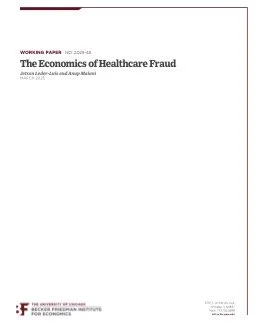By Jetson Leder-Luis and Anup Malani
Healthcare fraud imposes a sizable cost on U.S. public healthcare budgets and distorts health care provision. We examine the economics of health care fraud and enforcement using theory and data and connect to a growing literature on the topic. We first offer a new economic definition of health care fraud that captures and connects the wide range of activities prosecuted as fraud. We define fraud as any divergence between the care an insurer says a patient qualifies for, the care a provider provides, and the care a provider bills for. Our definition clarifies the economic consequences of different categories of fraud and provides a framework for understanding the slate of existing studies. Next, we examine the incentives for committing and for prosecuting fraud. We show how fraud is driven by a combination of inadequate (expected) penalties for fraud and imperfect reimbursement rates. Public anti-fraud litigation is driven by the relative monetary, political or career returns to prosecuting fraud and by prosecutorial budgets. Finally, we examine the prevalence of health care fraud prosecutions across types of fraud and types of care, and across the US, by machine learning on text data from Department of Justice press releases.
WORKING PAPER · NO. 2025-45
Chicago: University of Chicago, Becker Friedman Institute for Economics 2025. 45p




